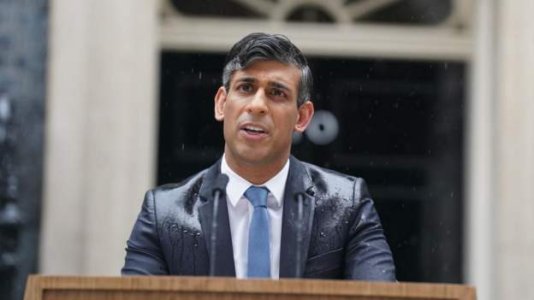Rishi Sunak warns of 'growing threats' as he announces tens of billions of pounds in extra defence funding
Rishi Sunak is to increase UK defence spending to 2.5% of GDP by 2030 as he warns European allies that the continent is at a "turning point" in the face of the growing threats from Russia, Iran and China.
Speaking alongside NATO Secretary General Jens Stoltenberg, the UK prime minister said he planned to steadily increase defence spending by the end of the decade, rising to 2.4% a year until 2027/28 - then hitting 2.5% by 2030/31.
Funding will rise from £64.6bn in 2024 to £78.2bn in 2028, and then jump to £87bn in 2030/31.
The government said the commitment amounted to an additional £75bn in funding over the next six years and would see the UK remain "by far the second largest defence spender in NATO after the US".
Labour's Steve Reed told Sky News' Politics Hub with Sophy Ridge that his party "would want to match" the pledge from the prime minister.
But he accused Mr Sunak of "belatedly seeing the defence of our country as important" after his performance in government on defence.
Making the announcement on a visit to Poland, Mr Sunak said the additional funding represented the "biggest strengthening of our national defence in a generation to meet the challenge of an increasingly dangerous world".
He revealed a further £10bn would be spent over the next decade on munitions production and modernisation of the armed forces, and that at least 5% of the defence budget would be committed to research and development.
The prime minister said: "An axis of autocratic states like Russia, Iran and China are increasingly working together to undermine democracies and reshape the world order.
"They are also investing heavily in their own militaries and in cyber capabilities and in low-cost technology, like the Shahed attack drones Iran fired towards Israel last weekend."
He added that this posed a "direct threat to the lives and livelihoods of people in the UK, as well as across Europe and the wider world", as he spoke of the need to take "further action now to deter these growing threats".
Asked by Sky News whether the UK had entered a "pre-war era", the prime minister said: "We have to recognise that the world... is a more dangerous place".
But he said the threats from the likes of Russia were "nothing new" - they just came at a new "pace and intensity", adding: "That's why it's important that we make this investment and we make this investment now."
However, Mr Sunak said the UK was approaching them "from a position of strength and confidence".
Pointing to Ukraine, he said recent gains by the Russians were equivalent to taking over Basildon and Eastbourne, adding: "The allies are united, defence spending is growing across Europe and NATO has two new members.
"If you take a step back, you know, Russia is not in any way succeeding."
The prime minister added: "We have been making the right investments. NATO is strong. Our alliance is strong. People are doing the right thing. And as you know... Russia has not succeeded.
"But we can't be complacent. And that's why [we are making] the announcement today."
Today's commitment comes after growing pressure on the prime minister to increase defence spending in the face of increasing threats from hostile states.
Last month, two serving ministers - Anne-Marie Trevelyan and Tom Tugendhat - publicly urged the government to invest at a "much greater pace".
The House of Commons' spending watchdog, the Public Accounts Committee, also warned the gap between the Ministry of Defence's budget and the cost of the UK's desired military capabilities had risen by £16.9bn - the largest deficit ever - despite a promised injection of more than £46bn over the next decade.
The increase in defence spending will go down well with Mr Sunak's supporters among the Tory grassroots and comes fresh from his landmark Rwanda legislation being passed, with the prime minister emphatic that a regular rhythm of flights will be taking off from July.
Both announcements are part of a publicity blitz for the embattled leader as he looks to get on the front foot ahead of next week's local elections, aware that a disastrous night could put him into freefall.
Source: SKY























